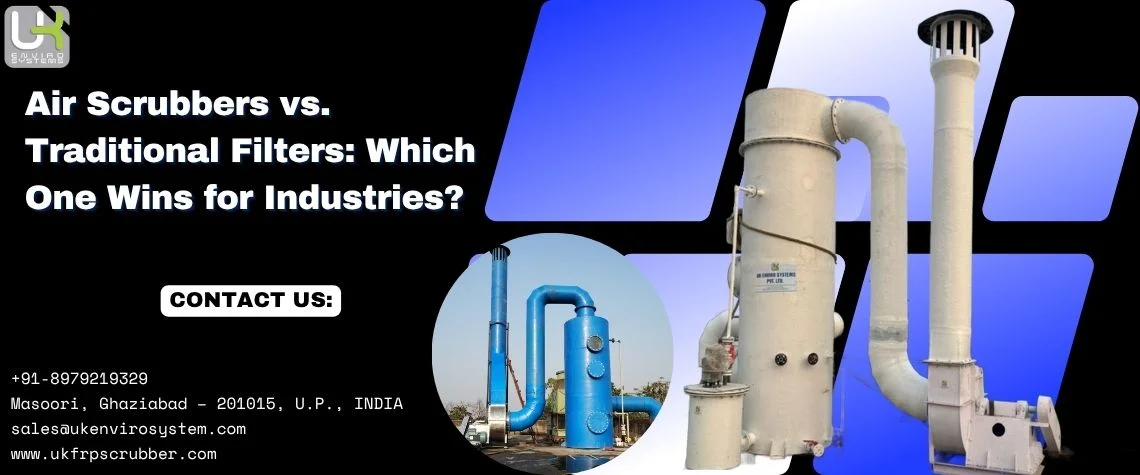Air Scrubbers vs. Traditional Filters: Which One Wins for Industries?

In today’s industrial landscape, controlling air pollution is not just a regulatory requirement but a necessity for sustainable operations. Scrubber Manufacturers in Rajasthan are playing a pivotal role in providing advanced air pollution control solutions, helping industries combat harmful emissions effectively. But when it comes to choosing between air scrubbers and traditional filters, which technology delivers better results? This blog explores the key differences, advantages, and applications of both systems to help industries make an informed decision.
Table of Contents
ToggleUnderstanding Air Scrubbers and Traditional Filters
What Are Air Scrubbers?
Air scrubbers are advanced Air Pollution Control Scrubbers designed to remove pollutants, gases, and particulate matter from industrial exhaust streams. These systems use liquid or dry scrubbing techniques to neutralize harmful contaminants before they are released into the atmosphere.
Types of Air Scrubbers:
- Wet Scrubbers:Use water or chemical solutions to absorb pollutants.
- Dry Scrubbers:Utilize dry reagents to neutralize acidic gases.
- Fume Scrubbers:Specifically target toxic fumes and vapors.
Leading Fume Scrubbers Manufacturers and PP FRP Scrubbers Manufacturers provide customized solutions to meet diverse industrial needs.
What Are Traditional Filters?
Traditional air filters, such as HEPA filters, baghouses, and electrostatic precipitators, physically trap particulate matter from the air. While effective for solid particles, they may struggle with gaseous pollutants.
Key Differences Between Air Scrubbers and Traditional Filters
- Pollutant Removal Efficiency
- Air Scrubbers:Excel in removing both particulate matter and gaseous pollutants (SO₂, NOx, VOCs).
- Traditional Filters:Mostly capture dust and solid particles but are ineffective against gases.
- Maintenance and Operational Costs
- Air Scrubbers:Require periodic cleaning and reagent replenishment but offer long-term cost savings by handling multiple pollutants.
- Traditional Filters:Need frequent replacements, increasing operational expenses over time.
- Space and Installation Requirements
- Air Scrubbers:Often compact and modular, making them ideal for industries with space constraints.
- Traditional Filters:Bulkier systems like baghouses demand more installation space.
- Environmental Impact
- Air Scrubbers:Reduce emissions significantly, aiding compliance with environmental regulations.
- Traditional Filters:Limited in controlling hazardous gases, leading to potential regulatory non-compliance.
Why Industries Are Shifting Towards Air Scrubbers?
With stricter environmental norms, industries are increasingly relying on Air Scrubbers Manufacturers for sustainable solutions. Here’s why:
- Multi-Pollutant Control: Unlike traditional filters, scrubbers can handle acidic gases, fumes, and particulates in a single system, reducing the need for multiple filtration units.
- Better Compliance with Emission Standards: Wet Scrubbers Manufacturersdesign systems that meet global emission norms, helping industries avoid penalties and shutdowns.
- Energy Efficiency: Modern scrubbers consume less energy compared to large baghouse filters, lowering operational costs.
- Long-Term Cost Savings: Though the initial investment may be higher, scrubbers reduce maintenance and disposal costs associated with traditional filters.
Industries That Benefit the Most from Air Scrubbers
- Chemical & Pharmaceutical: Handling toxic fumes and volatile organic compounds (VOCs) is critical, making scrubbers the preferred choice.
- Metal Processing & Smelting: Scrubbers efficiently capture acidic gases like sulfur dioxide (SO₂) and hydrogen fluoride (HF).
- Power Plants: Coal-fired plants benefit from scrubbers that control SO₂ and particulate emissions.
- Textile & Paper Mills: Wet scrubbers help in removing chemical fumes and dust generated during production.
When Should Industries Opt for Traditional Filters?
While scrubbers dominate in gas removal, traditional filters still have their place:
- For Dust-Only Applications:Industries dealing primarily with particulate matter (e.g., cement, woodworking) may find baghouses sufficient.
- Lower Initial Budget:Filters may be a short-term solution for small-scale operations with limited budgets.
Conclusion: Which One Wins?
The battle between air scrubbers and traditional filters ultimately depends on the industry’s specific needs. However, with rising environmental concerns and stricter regulations, Scrubber Manufacturers in Rajasthan are witnessing a surge in demand for Air Pollution Control Scrubbers.
For industries aiming for comprehensive pollution control, regulatory compliance, and long-term savings, air scrubbers are the clear winner. Meanwhile, traditional filters remain relevant for applications focused solely on particulate removal.
If you’re looking for high-quality scrubbers, partnering with trusted PP FRP Scrubbers Manufacturers or Wet Scrubbers Manufacturers can ensure optimal performance and durability for your industrial air purification needs.
Investing in the right technology today will not only enhance operational efficiency but also contribute to a cleaner, greener tomorrow.
